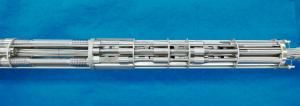The European steel that doesn't fear neutrons
European contractors have begun testing a candidate material for fusion reactors—a low-activation steel known as EUROFER97 that offers good resistance to high heat flux and neutron irradiation.
The European Domestic Agency has chosen EUROFER97 for the two Test Blanket Modules that it will test in ITER—the Helium-Cooled Pebble-Bed (HCPB) and the Helium-Cooled Lead Lithium (HCLL). By testing tritium concepts on ITER in a real fusion environment, scientists have a unique opportunity to explore the most promising techniques for tritium breeding that will be a critical technology for next-phase fusion devices.
Based on a contract signed with Studsvik (Sweden) in 2015, a series of tests will be performed to learn more about the physical and mechanical properties of EUROFER97.
With the help of Studsvik subcontractor NRG, testing has begun at the High Flux Reactor in Petten, the Netherlands, on samples of the material. By exposing the candidate steel to the same neutron radiation and temperature as in ITER the tests aim to demonstrate that EUROFER97 is sufficiently resistant.
After each irradiation phase, the metal will be transported back to Studsvik for detailed technical analysis. Researchers will look particularly at the brittleness of the material after irradiation, the microscopic changes that have taken place, and the extent to which material strength is affected.
Tests are expected to continue through early 2018.
Please see the original article on the European Domestic Agency website. Click here for more on the tritium breeding program at ITER.


